Hao Tong
CoDA: A Context-Decoupled Hierarchical Agent with Reinforcement Learning
Dec 14, 2025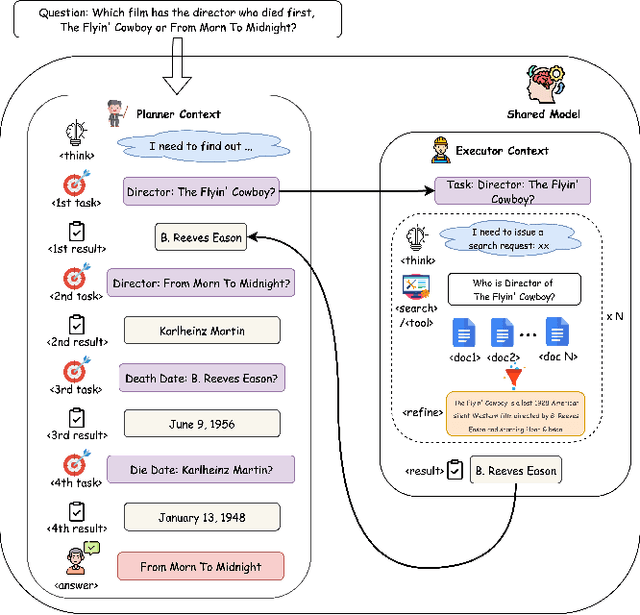
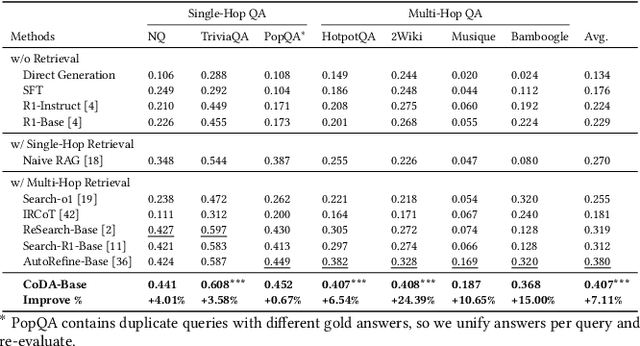
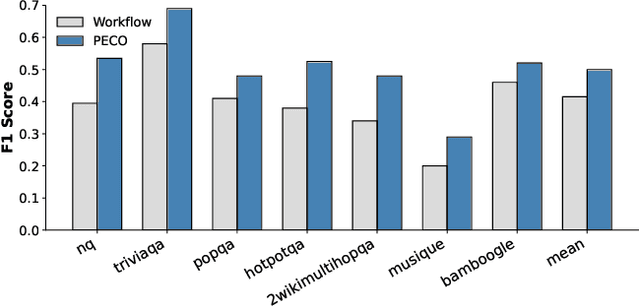

Abstract:Large Language Model (LLM) agents trained with reinforcement learning (RL) show great promise for solving complex, multi-step tasks. However, their performance is often crippled by "Context Explosion", where the accumulation of long text outputs overwhelms the model's context window and leads to reasoning failures. To address this, we introduce CoDA, a Context-Decoupled hierarchical Agent, a simple but effective reinforcement learning framework that decouples high-level planning from low-level execution. It employs a single, shared LLM backbone that learns to operate in two distinct, contextually isolated roles: a high-level Planner that decomposes tasks within a concise strategic context, and a low-level Executor that handles tool interactions in an ephemeral, isolated workspace. We train this unified agent end-to-end using PECO (Planner-Executor Co-Optimization), a reinforcement learning methodology that applies a trajectory-level reward to jointly optimize both roles, fostering seamless collaboration through context-dependent policy updates. Extensive experiments demonstrate that CoDA achieves significant performance improvements over state-of-the-art baselines on complex multi-hop question-answering benchmarks, and it exhibits strong robustness in long-context scenarios, maintaining stable performance while all other baselines suffer severe degradation, thus further validating the effectiveness of our hierarchical design in mitigating context overload.
Probing the Critical Point (CritPt) of AI Reasoning: a Frontier Physics Research Benchmark
Oct 01, 2025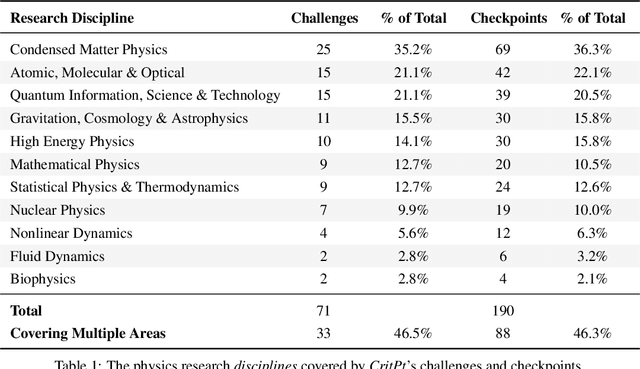
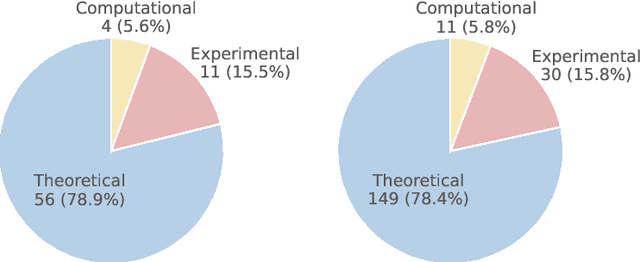
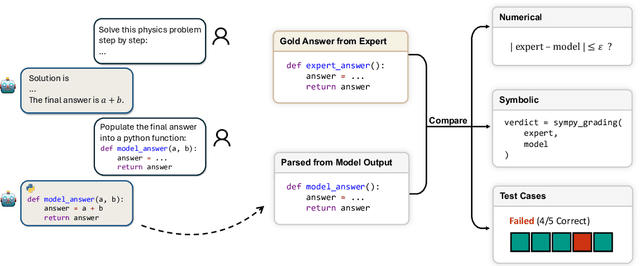
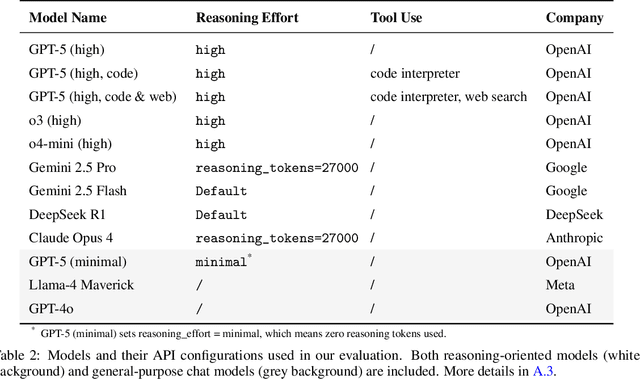
Abstract:While large language models (LLMs) with reasoning capabilities are progressing rapidly on high-school math competitions and coding, can they reason effectively through complex, open-ended challenges found in frontier physics research? And crucially, what kinds of reasoning tasks do physicists want LLMs to assist with? To address these questions, we present the CritPt (Complex Research using Integrated Thinking - Physics Test, pronounced "critical point"), the first benchmark designed to test LLMs on unpublished, research-level reasoning tasks that broadly covers modern physics research areas, including condensed matter, quantum physics, atomic, molecular & optical physics, astrophysics, high energy physics, mathematical physics, statistical physics, nuclear physics, nonlinear dynamics, fluid dynamics and biophysics. CritPt consists of 71 composite research challenges designed to simulate full-scale research projects at the entry level, which are also decomposed to 190 simpler checkpoint tasks for more fine-grained insights. All problems are newly created by 50+ active physics researchers based on their own research. Every problem is hand-curated to admit a guess-resistant and machine-verifiable answer and is evaluated by an automated grading pipeline heavily customized for advanced physics-specific output formats. We find that while current state-of-the-art LLMs show early promise on isolated checkpoints, they remain far from being able to reliably solve full research-scale challenges: the best average accuracy among base models is only 4.0% , achieved by GPT-5 (high), moderately rising to around 10% when equipped with coding tools. Through the realistic yet standardized evaluation offered by CritPt, we highlight a large disconnect between current model capabilities and realistic physics research demands, offering a foundation to guide the development of scientifically grounded AI tools.
OpenScholar: Synthesizing Scientific Literature with Retrieval-augmented LMs
Nov 21, 2024



Abstract:Scientific progress depends on researchers' ability to synthesize the growing body of literature. Can large language models (LMs) assist scientists in this task? We introduce OpenScholar, a specialized retrieval-augmented LM that answers scientific queries by identifying relevant passages from 45 million open-access papers and synthesizing citation-backed responses. To evaluate OpenScholar, we develop ScholarQABench, the first large-scale multi-domain benchmark for literature search, comprising 2,967 expert-written queries and 208 long-form answers across computer science, physics, neuroscience, and biomedicine. On ScholarQABench, OpenScholar-8B outperforms GPT-4o by 5% and PaperQA2 by 7% in correctness, despite being a smaller, open model. While GPT4o hallucinates citations 78 to 90% of the time, OpenScholar achieves citation accuracy on par with human experts. OpenScholar's datastore, retriever, and self-feedback inference loop also improves off-the-shelf LMs: for instance, OpenScholar-GPT4o improves GPT-4o's correctness by 12%. In human evaluations, experts preferred OpenScholar-8B and OpenScholar-GPT4o responses over expert-written ones 51% and 70% of the time, respectively, compared to GPT4o's 32%. We open-source all of our code, models, datastore, data and a public demo.
SciCode: A Research Coding Benchmark Curated by Scientists
Jul 18, 2024



Abstract:Since language models (LMs) now outperform average humans on many challenging tasks, it has become increasingly difficult to develop challenging, high-quality, and realistic evaluations. We address this issue by examining LMs' capabilities to generate code for solving real scientific research problems. Incorporating input from scientists and AI researchers in 16 diverse natural science sub-fields, including mathematics, physics, chemistry, biology, and materials science, we created a scientist-curated coding benchmark, SciCode. The problems in SciCode naturally factorize into multiple subproblems, each involving knowledge recall, reasoning, and code synthesis. In total, SciCode contains 338 subproblems decomposed from 80 challenging main problems. It offers optional descriptions specifying useful scientific background information and scientist-annotated gold-standard solutions and test cases for evaluation. Claude3.5-Sonnet, the best-performing model among those tested, can solve only 4.6% of the problems in the most realistic setting. We believe that SciCode demonstrates both contemporary LMs' progress towards becoming helpful scientific assistants and sheds light on the development and evaluation of scientific AI in the future.
Local Optima Correlation Assisted Adaptive Operator Selection
May 03, 2023

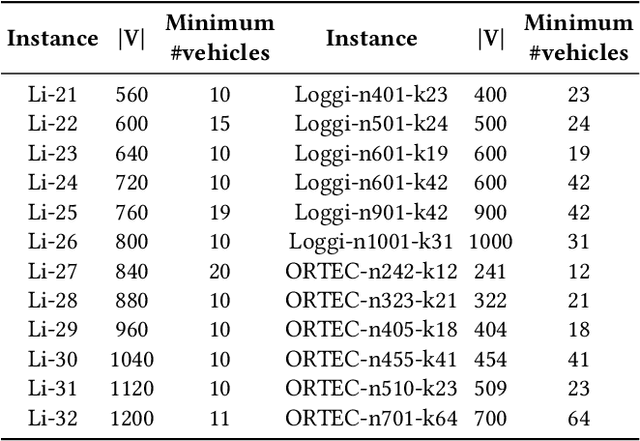

Abstract:For solving combinatorial optimisation problems with metaheuristics, different search operators are applied for sampling new solutions in the neighbourhood of a given solution. It is important to understand the relationship between operators for various purposes, e.g., adaptively deciding when to use which operator to find optimal solutions efficiently. However, it is difficult to theoretically analyse this relationship, especially in the complex solution space of combinatorial optimisation problems. In this paper, we propose to empirically analyse the relationship between operators in terms of the correlation between their local optima and develop a measure for quantifying their relationship. The comprehensive analyses on a wide range of capacitated vehicle routing problem benchmark instances show that there is a consistent pattern in the correlation between commonly used operators. Based on this newly proposed local optima correlation metric, we propose a novel approach for adaptively selecting among the operators during the search process. The core intention is to improve search efficiency by preventing wasting computational resources on exploring neighbourhoods where the local optima have already been reached. Experiments on randomly generated instances and commonly used benchmark datasets are conducted. Results show that the proposed approach outperforms commonly used adaptive operator selection methods.
A Novel Generalised Meta-Heuristic Framework for Dynamic Capacitated Arc Routing Problems
Apr 14, 2021


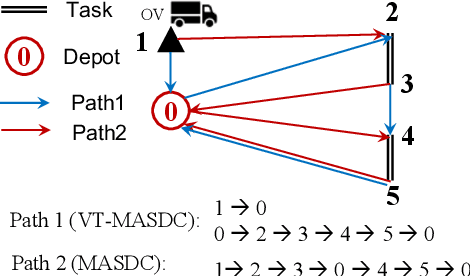
Abstract:The capacitated arc routing problem (CARP) is a challenging combinatorial optimisation problem abstracted from typical real-world applications, like waste collection and mail delivery. However, few studies considered dynamic changes during the vehicles' service, which can make the original schedule infeasible or obsolete. The few existing studies are limited by dynamic scenarios that can suffer single types of dynamic events, and by algorithms that rely on special operators or representations, being unable to benefit from the wealth of contributions provided by the static CARP literature. Here, we provide the first mathematical formulation for dynamic CARP (DCARP) and design a simulation system to execute the CARP solutions and generate DCARP instances with several common dynamic events. We then propose a novel framework able to generalise all existing static CARP optimisation algorithms so that they can cope with DCARP instances. The framework has the option to enhance optimisation performance for DCARP instances based on a restart strategy that makes no use of past history, and a sequence transfer strategy that benefits from past optimisation experience. Empirical studies are conducted on a wide range of DCARP instances. The results highlight the need for tackling dynamic changes and show that the proposed framework significantly improves over existing algorithms.
Robust Reinforcement Learning for General Video Game Playing
Nov 11, 2020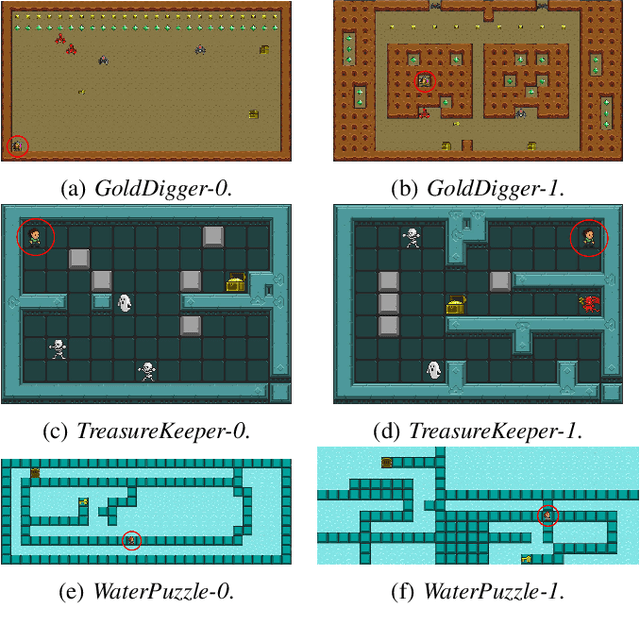
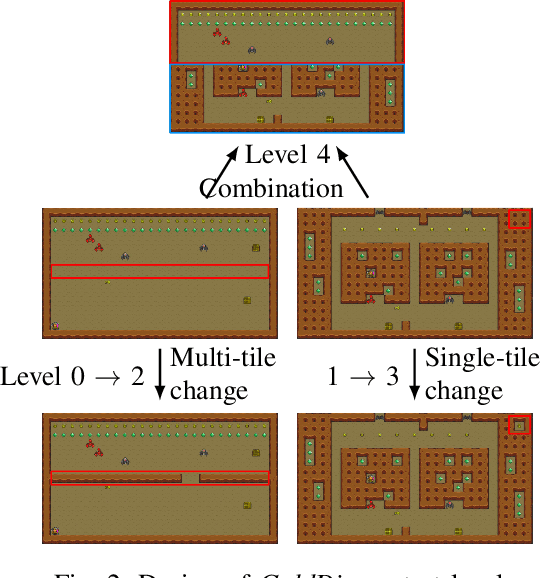
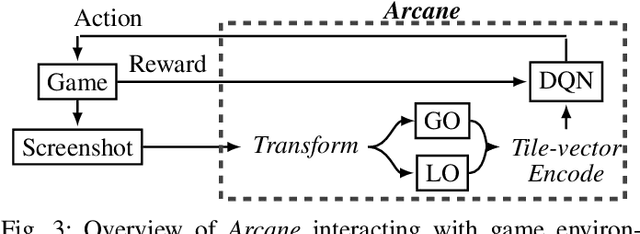
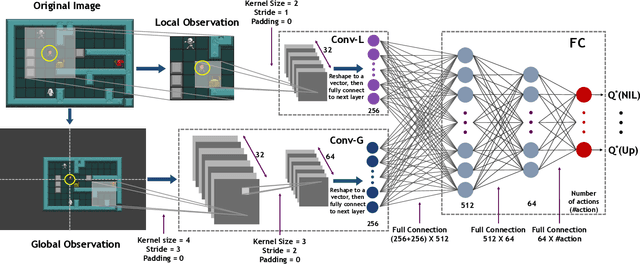
Abstract:Reinforcement learning has successfully learned to play challenging board and video games. However, its generalization ability remains under-explored. The General Video Game AI Learning Competition aims at designing agents that are capable of learning to play different games levels that were unseen during training. This paper presents the games, entries and results of the 2020 General Video Game AI Learning Competition, held at the Sixteenth International Conference on Parallel Problem Solving from Nature and the 2020 IEEE Conference on Games. Three new games with sparse, periodic and dense rewards, respectively, were designed for this competition and the test levels were generated by adding minor perturbations to training levels or combining training levels. In this paper, we also design a reinforcement learning agent, called Arcane, for general video game playing. We assume that it is more likely to observe similar local information in different levels rather than global information. Therefore, instead of directly inputting a single, raw pixel-based screenshot of current game screen, Arcane takes the encoded, transformed global and local observations of the game screen as two simultaneous inputs, aiming at learning local information for playing new levels. Two versions of Arcane, using a stochastic or deterministic policy for decision-making during test, both show robust performance on the game set of the 2020 General Video Game AI Learning Competition.
Algorithm Portfolio for Individual-based Surrogate-Assisted Evolutionary Algorithms
Apr 22, 2019



Abstract:Surrogate-assisted evolutionary algorithms (SAEAs) are powerful optimisation tools for computationally expensive problems (CEPs). However, a randomly selected algorithm may fail in solving unknown problems due to no free lunch theorems, and it will cause more computational resource if we re-run the algorithm or try other algorithms to get a much solution, which is more serious in CEPs. In this paper, we consider an algorithm portfolio for SAEAs to reduce the risk of choosing an inappropriate algorithm for CEPs. We propose two portfolio frameworks for very expensive problems in which the maximal number of fitness evaluations is only 5 times of the problem's dimension. One framework named Par-IBSAEA runs all algorithm candidates in parallel and a more sophisticated framework named UCB-IBSAEA employs the Upper Confidence Bound (UCB) policy from reinforcement learning to help select the most appropriate algorithm at each iteration. An effective reward definition is proposed for the UCB policy. We consider three state-of-the-art individual-based SAEAs on different problems and compare them to the portfolios built from their instances on several benchmark problems given limited computation budgets. Our experimental studies demonstrate that our proposed portfolio frameworks significantly outperform any single algorithm on the set of benchmark problems.
Voronoi-based Efficient Surrogate-assisted Evolutionary Algorithm for Very Expensive Problems
Jan 17, 2019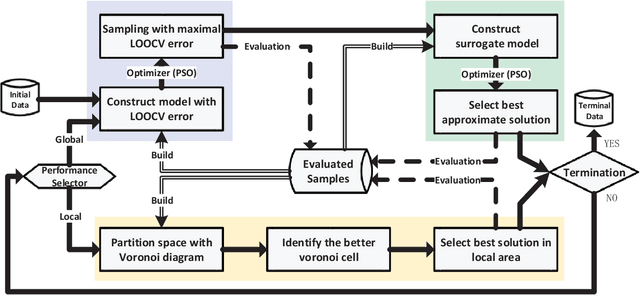
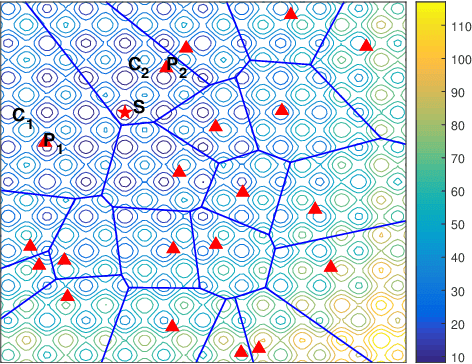
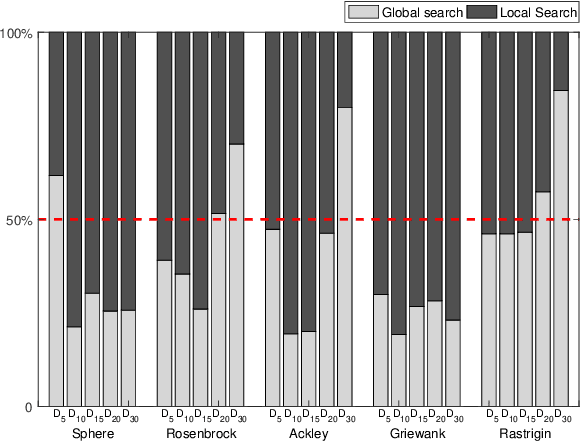
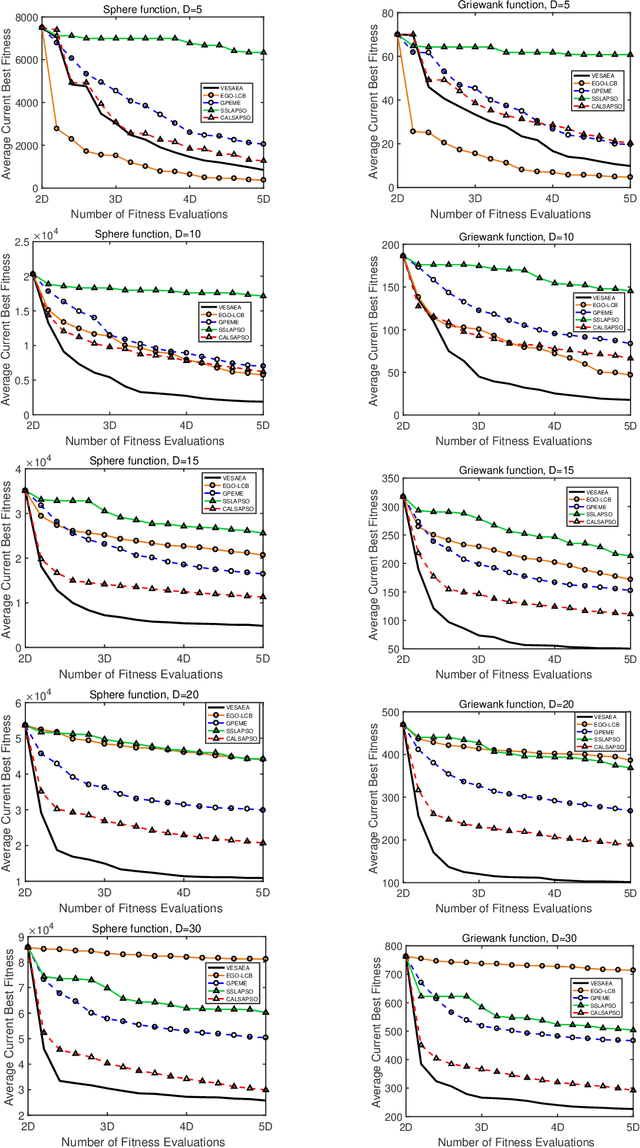
Abstract:Very expensive problems are very common in practical system that one fitness evaluation costs several hours or even days. Surrogate assisted evolutionary algorithms (SAEAs) have been widely used to solve this crucial problem in the past decades. However, most studied SAEAs focus on solving problems with a budget of at least ten times of the dimension of problems which is unacceptable in many very expensive real-world problems. In this paper, we employ Voronoi diagram to boost the performance of SAEAs and propose a novel framework named Voronoi-based efficient surrogate assisted evolutionary algorithm (VESAEA) for very expensive problems, in which the optimization budget, in terms of fitness evaluations, is only 5 times of the problem's dimension. In the proposed framework, the Voronoi diagram divides the whole search space into several subspace and then the local search is operated in some potentially better subspace. Additionally, in order to trade off the exploration and exploitation, the framework involves a global search stage developed by combining leave-one-out cross-validation and radial basis function surrogate model. A performance selector is designed to switch the search dynamically and automatically between the global and local search stages. The empirical results on a variety of benchmark problems demonstrate that the proposed framework significantly outperforms several state-of-art algorithms with extremely limited fitness evaluations. Besides, the efficacy of Voronoi-diagram is furtherly analyzed, and the results show its potential to optimize very expensive problems.
 Add to Chrome
Add to Chrome Add to Firefox
Add to Firefox Add to Edge
Add to Edge